Overview
The OpenAI API is designed with compassion in mind, ensuring HIPAA compliance so that healthcare providers can harness its advanced capabilities while protecting electronic Protected Health Information (ePHI). This is crucial, as many providers face emotional challenges in safeguarding patient data amidst increasing administrative burdens. By outlining essential compliance measures, such as the necessity of a Business Associate Agreement (BAA) and strict data security protocols, we can collectively safeguard patient information. These steps not only enhance trust in medical practices but also alleviate some of the pressures that healthcare providers experience.
Have you ever felt overwhelmed by the complexities of compliance? You're not alone. Many healthcare professionals share this concern, and that's why understanding these protective measures is vital. By embracing these protocols, you can foster a safer environment for your patients, ensuring their information is secure while allowing you to focus on what truly matters—their care.
In summary, the commitment to HIPAA compliance through the OpenAI API offers a pathway to not only meet regulatory requirements but also to enhance the trust and confidence of your patients. Let’s work together to create a healthcare landscape where technology and compassion coexist, ensuring that every patient feels valued and protected.
Introduction
In the complex world of healthcare, the stakes are incredibly high when it comes to safeguarding patient information. Healthcare providers often find themselves grappling with a pressing concern: Is the OpenAI API HIPAA compliant? This question weighs heavily on their minds as they strive to deliver quality care.
As the integration of AI technologies becomes more prevalent, the emotional challenges faced by medical professionals can feel overwhelming. Administrative burdens can detract from the focus on patient care, leading to a sense of frustration and concern. Understanding the nuances of HIPAA compliance is not just beneficial; it is essential for maintaining patient trust and operational efficiency.
So, how can providers confidently adopt innovative tools without compromising the integrity of patient data? By exploring compliance requirements and leveraging AI solutions thoughtfully, healthcare professionals can navigate this intricate landscape with care and empathy. Let’s delve into the insights that can guide you on this important journey.
CosmaNeura: AI Solutions for HIPAA Compliance in Healthcare
In the demanding world of healthcare, professionals often face overwhelming administrative burdens that can detract from their ability to provide quality patient care. CosmaNeura understands these challenges and provides advanced AI solutions specifically tailored for medical providers, which ensures that the OpenAI API is HIPAA compliant. By automating these tasks, the platform not only enhances operational efficiency but also fortifies the protection of patient data, aligning seamlessly with the ethical standards of Catholic teachings.
This commitment to adherence and efficiency positions CosmaNeura as a leader in the faith-centered medical field. Imagine having the tools that not only improve operational effectiveness but also strengthen patient trust. In an environment where rising medical expenses strain financial resources, CosmaNeura's AI solutions enhance financial efficiency, allowing providers to focus on delivering quality care without compromising their ethical standards.
With 43% of medical data breaches attributed to human error, the integration of AI significantly reduces risks by streamlining processes and lowering the potential for mistakes. As medical organizations increasingly embrace AI technologies—75% of top firms are experimenting with or planning to scale generative AI—CosmaNeura stands out by ensuring these innovations are executed within a framework of ethical responsibility.
This dual focus not only improves the quality of care but also strengthens the integrity and confidentiality of patient information, which is essential for maintaining trust in the medical system. As medical practitioners contemplate adopting AI solutions like CosmaNeura's, they can enhance their compliance and operational efficiency, especially considering if the OpenAI API is HIPAA compliant, while staying true to the principles that are vital to their mission. How can you ensure that your practice thrives while remaining committed to ethical care? Let CosmaNeura guide you on this journey towards a more efficient and compassionate healthcare experience.
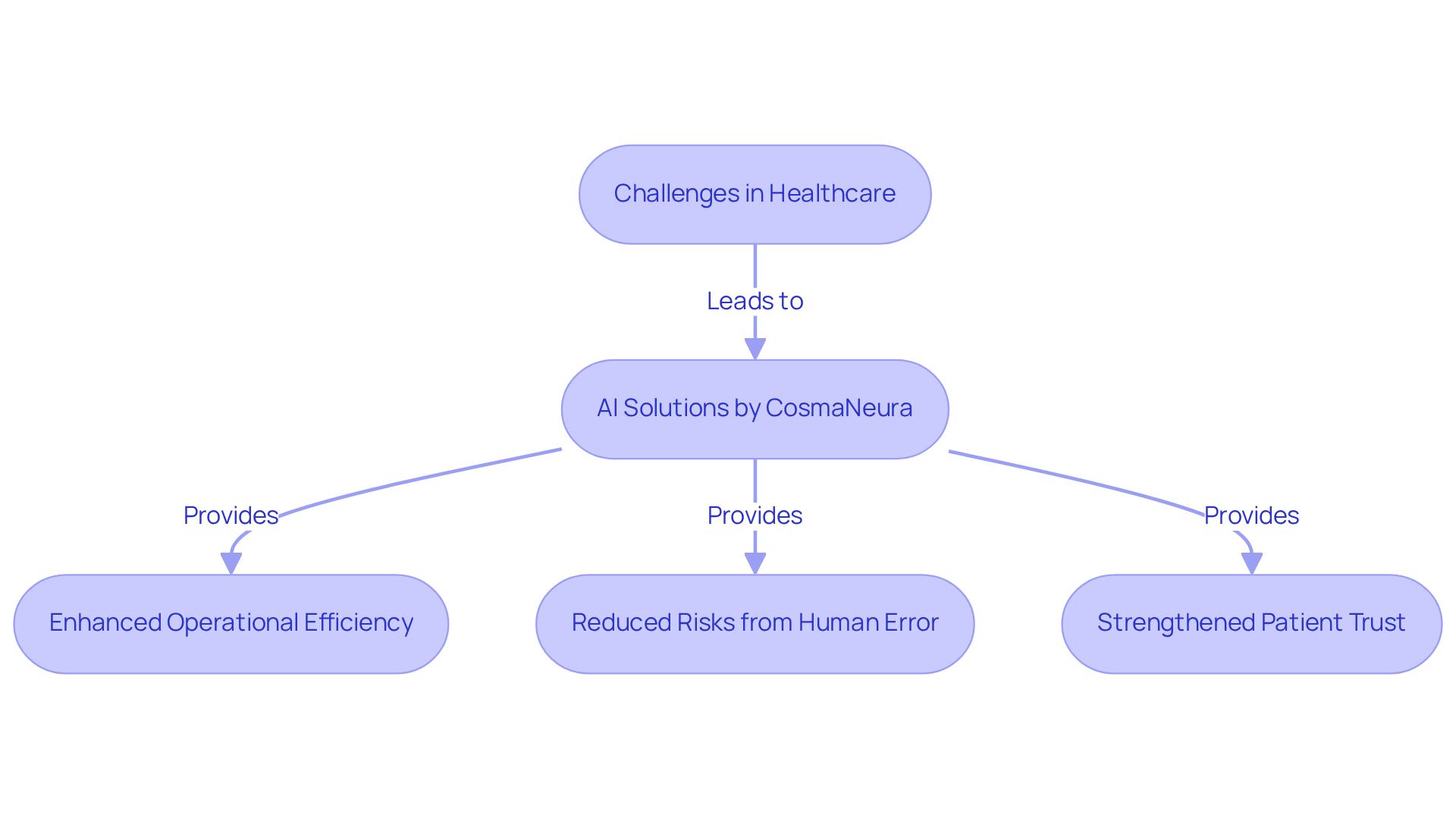
Understanding HIPAA Compliance Requirements for OpenAI API
In today's healthcare environment, ensuring HIPAA compliance can feel overwhelming for medical providers. It's essential to safeguard patient information, as the emotional weight of protecting electronic Protected Health Information (ePHI) is significant. By configuring the OpenAI API correctly, you can take a vital step toward ensuring that your patients' data is secure, as the OpenAI API is HIPAA compliant.
Consider implementing robust safeguards that encrypt data during transmission and establish strict access controls. These measures not only protect sensitive information but also foster trust with your patients. Regular risk assessments can help identify and mitigate potential vulnerabilities, allowing you to focus on what truly matters—providing exceptional care.
Are you ready to embrace these practices? By prioritizing patient privacy, you not only comply with regulations but also enhance the quality of care you deliver. Let's work together to create a safer environment for your patients, ensuring their information is treated with the utmost respect and protection.
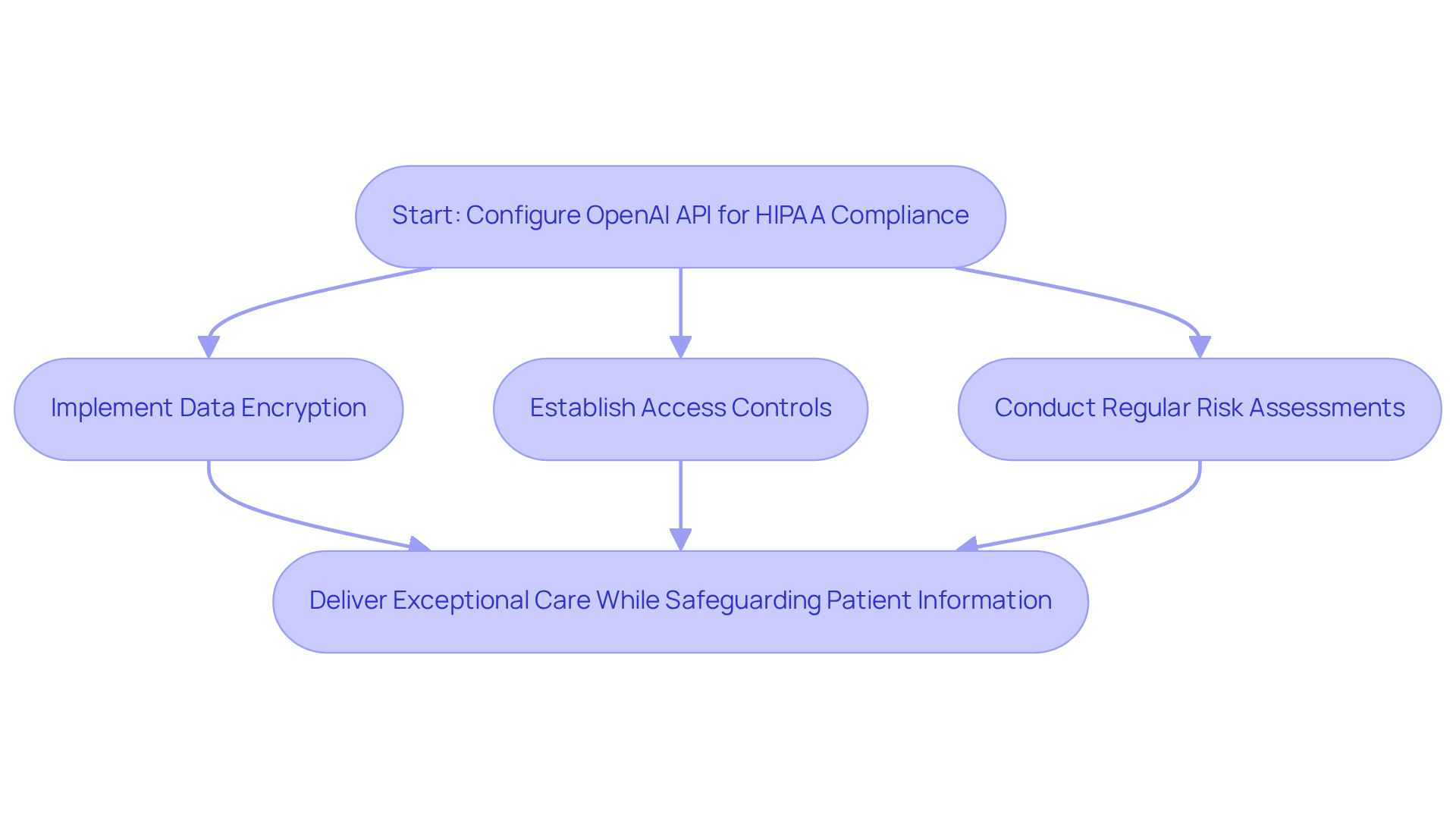
Business Associate Agreement (BAA) Availability with OpenAI
OpenAI offers medical organizations the opportunity to enter into a Business Associate Agreement (BAA) when utilizing its API services. This agreement is crucial for outlining the responsibilities of both parties in managing electronic protected health information (ePHI). By signing a BAA, healthcare professionals can leverage OpenAI's advanced technology while ensuring that it is OpenAI API HIPAA compliant, ultimately protecting patient information effectively.
Current trends highlight an increasing focus on BAAs among medical technology companies, as these agreements are vital for fostering trust and accountability in information management. Have you considered how a well-structured BAA can clarify compliance obligations and enhance your organization's security posture? Engaging in a BAA with technology companies like OpenAI allows organizations to benefit from robust information protection measures, including encryption and continuous security monitoring.
Moreover, the BAA with OpenAI assures medical providers that they can confidently adopt AI-driven solutions, as it is OpenAI API HIPAA compliant. This assurance is particularly important as the medical sector faces escalating cyber threats, with hacking incidents constituting a significant portion of information breaches. By formalizing their relationship through a BAA, medical organizations can effectively mitigate risks associated with data handling and reinforce their dedication to patient privacy.
Examples of medical organizations successfully entering BAAs with technology companies illustrate the tangible benefits of such agreements. These partnerships not only facilitate adherence to regulations but also empower providers to focus on delivering quality care, free from the weight of administrative burdens. As the healthcare technology landscape continues to evolve, understanding whether the OpenAI API is HIPAA compliant through the significance of BAAs remains critical. Are you ready to take the next step in safeguarding your patients' information?
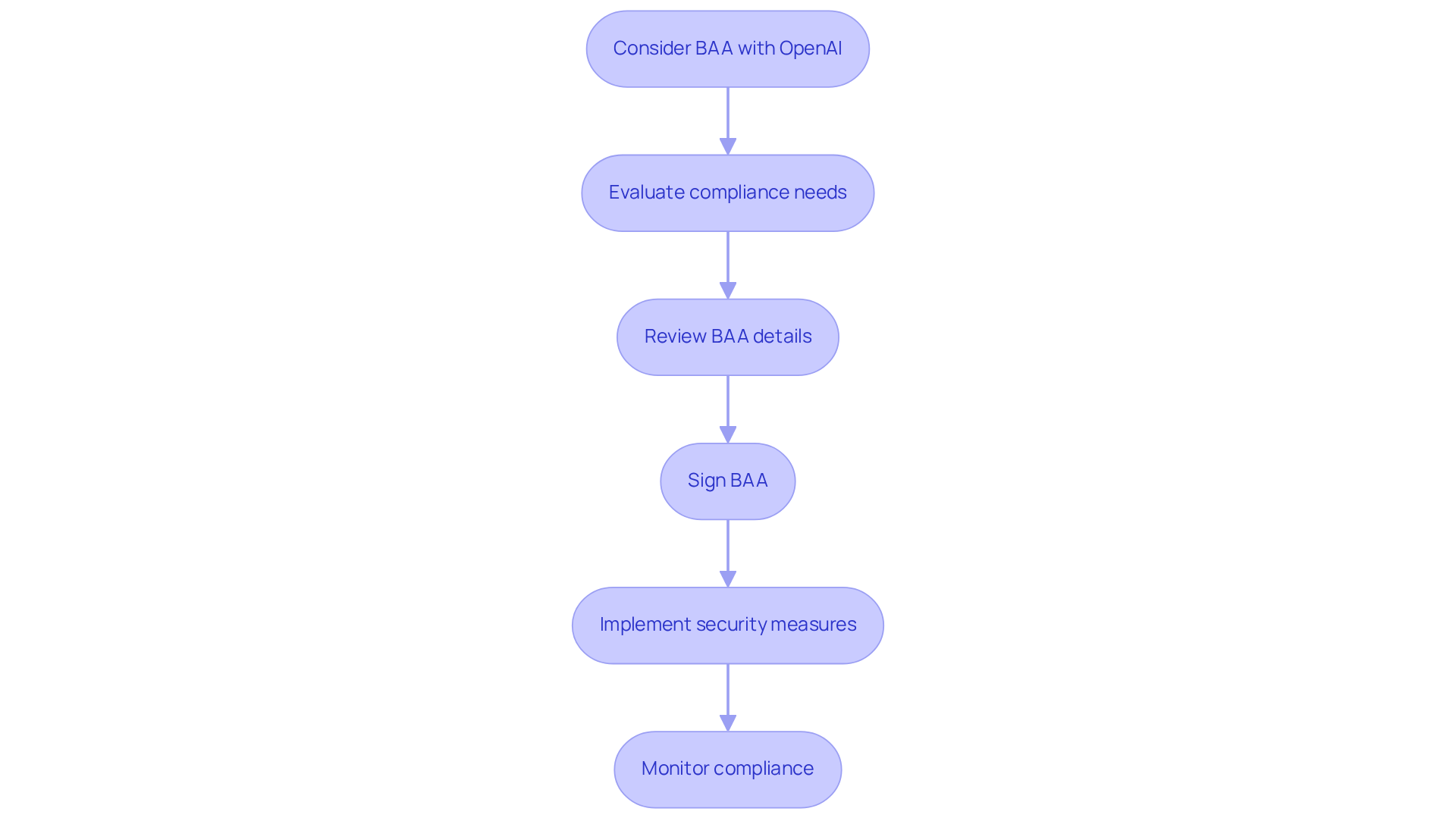
Zero Retention Requirement: Implications for Patient Data Security
In today’s healthcare environment, the emotional challenges faced by providers are significant, particularly when it comes to ensuring patient information security. The zero retention requirement established by OpenAI addresses these concerns, as it guarantees that no information processed through its API is retained. This policy significantly enhances patient information security, reducing the likelihood of unauthorized access or breaches by ensuring sensitive information is not kept beyond its necessary use.
Healthcare providers can effectively leverage this feature to uphold HIPAA compliance, confirming that the OpenAI API is HIPAA compliant while utilizing AI tools. For instance, organizations adopting zero retention policies can enhance their information security posture. These measures directly address the growing concerns surrounding breaches, which have surged in recent years. Did you know that in 2023, an average of 1.99 breaches of medical information were reported each day? This statistic underscores the urgency of robust protection strategies.
Hacking incidents accounted for over 64% of all breaches from 2005 to 2019, highlighting the critical need for proactive strategies. By implementing zero retention, providers not only protect patient information but also demonstrate that the OpenAI API is HIPAA compliant, aligning with the minimum necessary standard mandated by HIPAA while safeguarding individually identifiable health information. This approach is essential, especially when the average expense of a data breach in the medical field has risen to $6.45 million, a notable increase from $294 per record in 2010 to $429 in 2019.
As AI progresses, its incorporation with zero retention policies will further improve adherence and security. This enables medical professionals to concentrate on providing quality care without undermining patient trust. It’s time to embrace these innovative solutions, ensuring that patient information remains secure and that healthcare providers can focus on what truly matters—their patients.
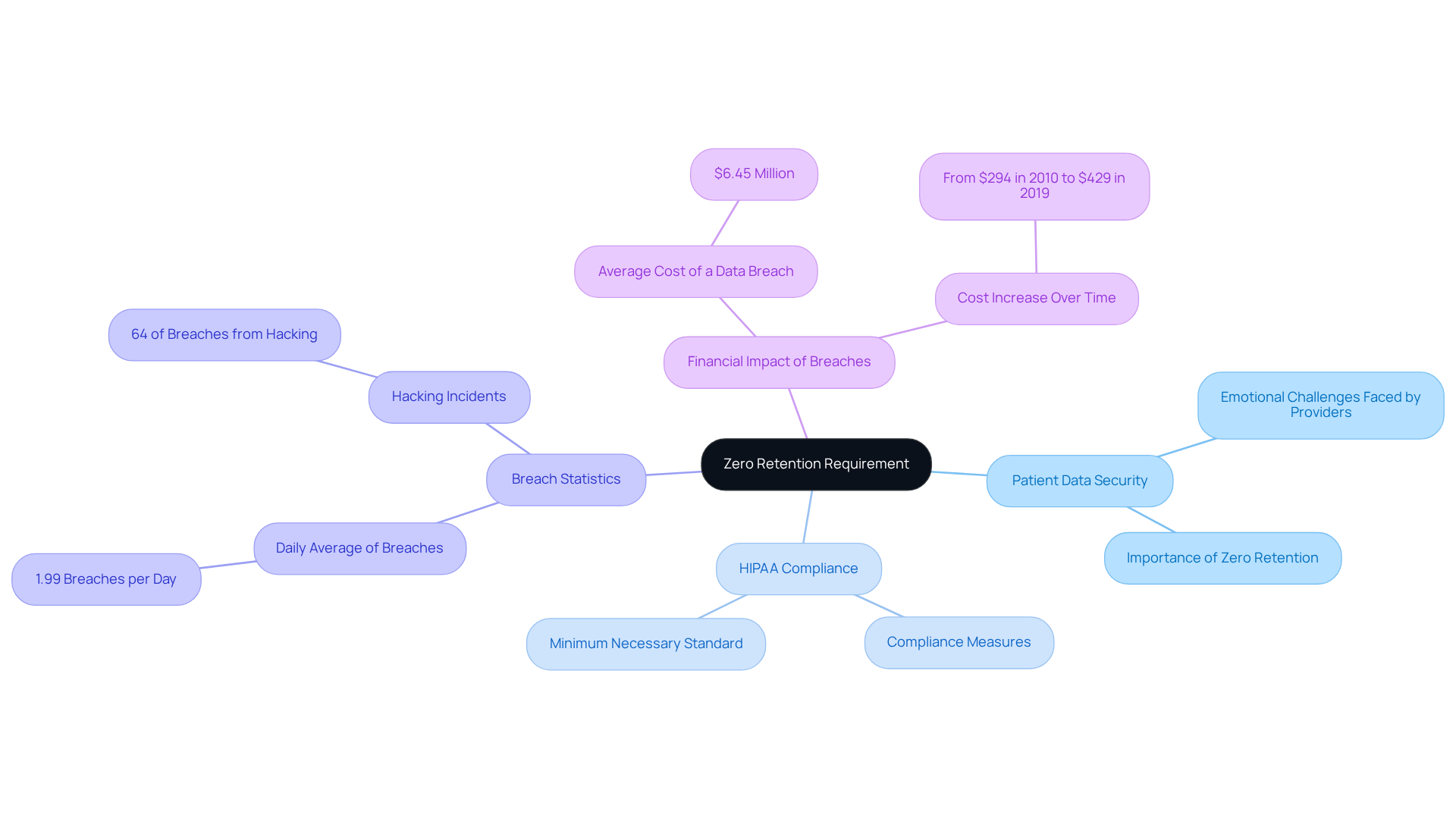
ChatGPT vs OpenAI API: HIPAA Compliance Comparison
In medical environments, understanding the difference between ChatGPT and the OpenAI API is crucial, especially concerning HIPAA regulations. The statement that the OpenAI API is HIPAA compliant indicates it is specifically designed to meet HIPAA requirements and provides essential safeguards for handling electronic Protected Health Information (ePHI). In contrast, the standard version of ChatGPT lacks these vital protections, rendering it unsuitable for medical applications where patient data security is paramount.
As healthcare providers face increasing pressure, with the adoption of AI technologies rising from 16% to 31% in just one year, prioritizing compliance is essential to avoid potential violations of HIPAA regulations. Utilizing the OpenAI API, which is HIPAA compliant, not only ensures adherence to these regulations but also empowers medical professionals to harness AI capabilities effectively and securely. Have you considered how this technology could enhance your practice while safeguarding patient information?
Furthermore, it is crucial for medical providers to establish a Business Associate Agreement (BAA) with OpenAI to ensure the secure handling of PHI. Failure to adhere to HIPAA can lead to substantial penalties, as highlighted by recent measures from the Federal Trade Commission against organizations improperly managing patient information. Thus, selecting the OpenAI API is not just about using advanced technology; it is a vital step in confirming that the OpenAI API is HIPAA compliant, which helps protect patient information and preserve trust in medical practices.
By choosing the right tools, we can navigate these challenges together, ensuring that patient care remains at the forefront of our efforts.
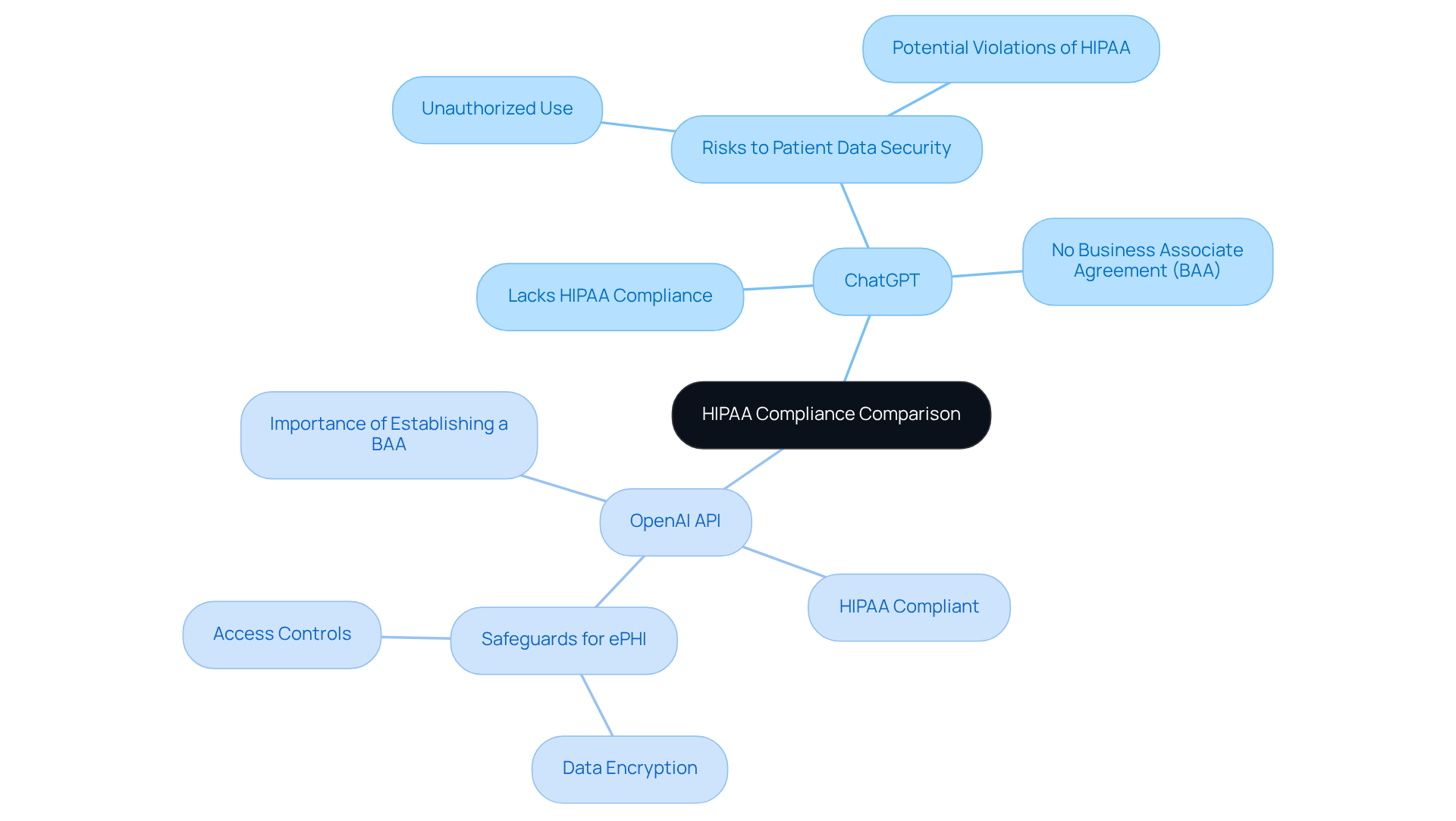
Implementation Steps for Achieving HIPAA Compliance with OpenAI API
Healthcare professionals often face emotional challenges when trying to ensure that the OpenAI API is HIPAA compliant while incorporating innovative solutions. The administrative burdens can weigh heavily, impacting the quality of patient care. To help navigate these complexities, here are some essential steps to consider:
- Sign a Business Associate Agreement (BAA) with OpenAI.
- Implement encryption for all data in transit.
- Establish strict access controls to limit who can access ePHI.
- Conduct regular risk assessments to identify vulnerabilities.
- Train staff on HIPAA adherence and data security best practices.
By following these steps, providers can not only ensure compliance but also effectively integrate AI into their workflows. This approach not only safeguards sensitive information but also enhances the overall quality of care, allowing healthcare professionals to focus more on their patients. If you have any questions or need further guidance, please reach out—your commitment to patient care is truly commendable.
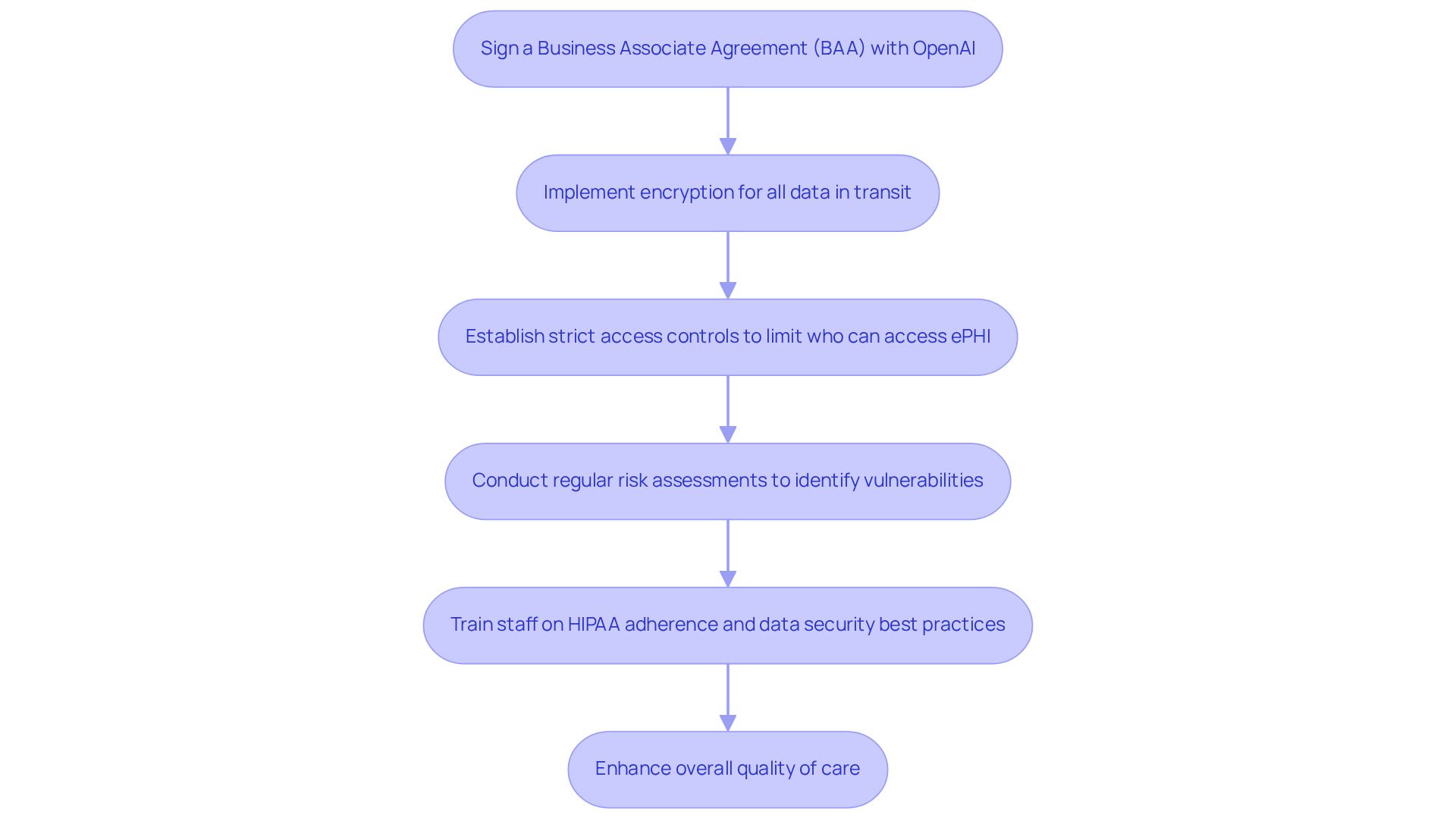
Ongoing Monitoring and Staff Training for HIPAA Compliance
Ensuring adherence to HIPAA is not a one-time effort; it requires ongoing monitoring and regular staff training. Healthcare organizations face the emotional challenge of navigating compliance while providing quality patient care. Continuous compliance monitoring systems are essential to swiftly detect and address potential violations, alleviating some of this burden.
Routine training sessions are crucial to keep staff informed on HIPAA regulations and best practices for protecting patient information. Did you know that just 36% of organizations have automated third-party monitoring? This statistic underscores the necessity for efficient tools to simplify vendor evaluations and improve oversight. By enhancing these processes, organizations can significantly lower the risk of breaches, as 35% of all reported data breaches involve third-party vendors.
Furthermore, new hires must undergo role-specific HIPAA training within 30 days, reinforcing the urgency of timely training for compliance. A proactive training approach, including role-specific education and annual refresher courses, fosters a culture of accountability and trust within the workforce. As medical regulations evolve, staying updated through continuous education not only mitigates risks but also enhances patient care and organizational integrity.
In summary, prioritizing continuous training and compliance monitoring is vital. By embracing these practices, healthcare organizations can better support their staff and patients, ultimately leading to a safer and more trustworthy environment. How can your organization enhance its training and compliance efforts today?
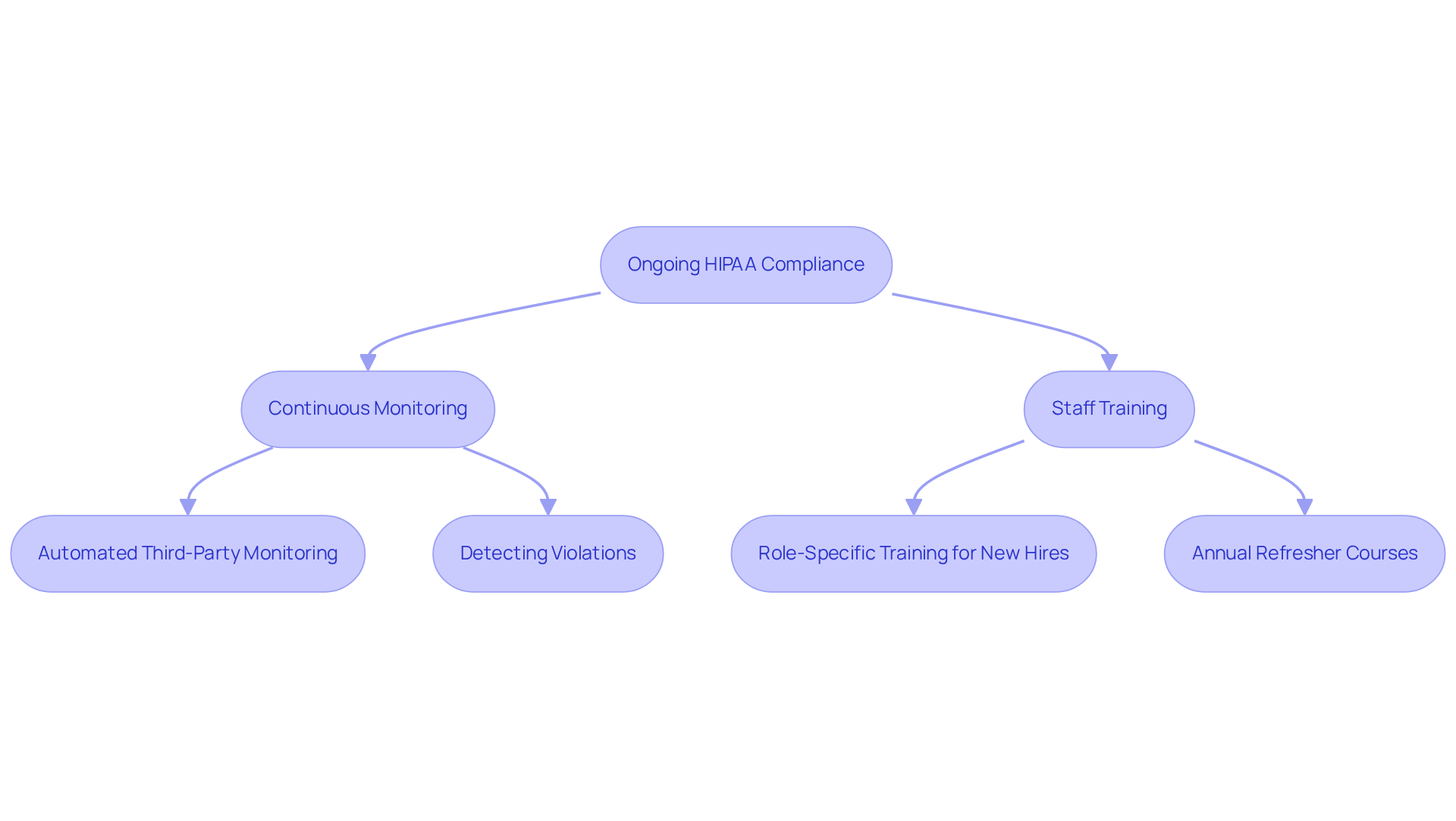
Integration Advantages of CosmaNeura with OpenAI for Healthcare Providers
For medical professionals, the integration of CosmaNeura with OpenAI offers a compassionate solution to the emotional and financial challenges they face. Rising expenses in the healthcare industry can feel overwhelming, but by leveraging CosmaNeura's AI-driven administrative tools—like automated scheduling and billing optimization—alongside OpenAI's advanced language processing capabilities, healthcare providers can find relief. This collaboration not only enhances administrative efficiency but also fosters improved patient engagement while confirming that the OpenAI API is HIPAA compliant.
Imagine a world where workflows are streamlined, allowing for better communication and coordination among medical professionals. This is essential in reducing the fragmentation that often hinders patient care. Recent insights from customer interviews highlight these pain points, showing how this partnership enhances the overall quality of patient care. Providers can dedicate more time to delivering ethical and effective treatment, focusing on what truly matters—their patients.
If you’re feeling the weight of administrative burdens, consider how this integration can support you. By embracing these innovative tools, you can transform your practice, reduce stress, and ultimately improve the care you provide. Together, we can navigate these challenges and elevate the standard of patient care.
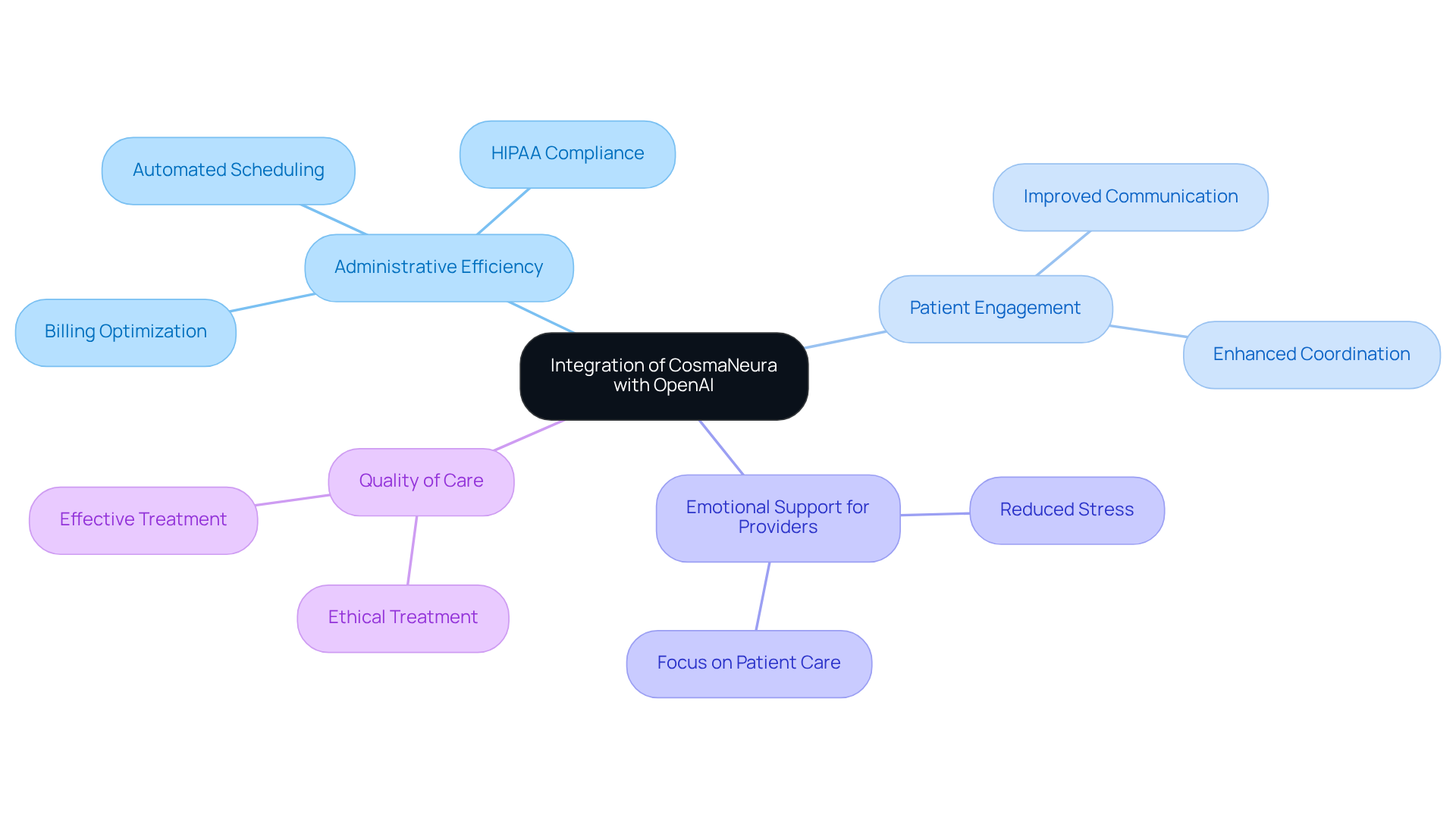
Exploring Other HIPAA-Compliant AI Alternatives for Healthcare
Healthcare providers often face emotional challenges that can feel overwhelming. In addition to OpenAI, there are several AI solutions available that are OpenAI API HIPAA compliant, which can help ease some of these burdens. Providers should consider various platforms to see if the OpenAI API is HIPAA compliant, as it offers automation tools specifically designed for healthcare. These alternatives can provide comparable functionalities while ensuring that patient information is safeguarded in accordance with HIPAA standards, which is why it is important to know if the OpenAI API is HIPAA compliant.
By assessing various choices, providers can select the most suitable tools that align with their operational needs and regulatory requirements. It’s essential to recognize that in 2023, an average of 1.99 breaches involving 500 or more records were reported each day. This statistic emphasizes the urgent need for dependable regulatory solutions. Moreover, 32% of all documented data breaches from 2015 to 2022 occurred in the medical sector, highlighting the vulnerability of medical data and the importance of implementing effective regulatory solutions.
What steps are you taking to protect your patients' information? Consider exploring these HIPAA-compliant tools to not only safeguard sensitive data but also enhance your practice's efficiency. Together, we can work towards a more secure and compassionate healthcare environment.
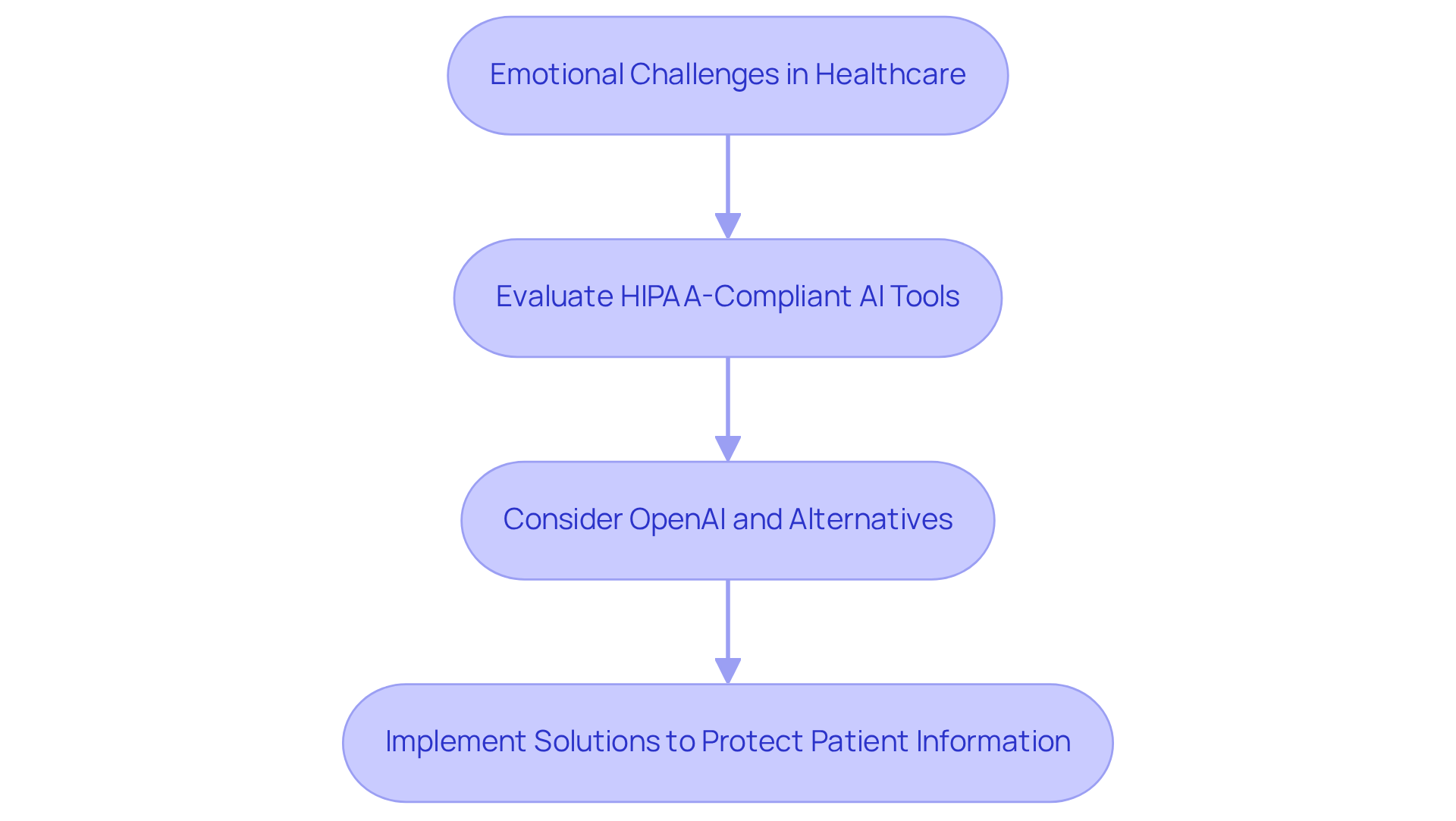
Best Practices for Compliance Verification in Healthcare AI Solutions
To ensure compliance in healthcare AI solutions, providers face significant emotional and operational challenges. It's crucial to address these concerns with best practices that foster understanding and support.
-
Perform Thorough Due Diligence on AI Suppliers: Confirming that AI vendors have strong regulatory measures is essential. Assess their adherence to relevant regulations and standards, including whether the OpenAI API is HIPAA compliant, to mitigate risks associated with data breaches and non-compliance. As highlighted in the Accenture Risk Study, "More than half of regulatory leaders claim they utilize advanced technologies to enhance their oversight operations and team performance."
-
Regularly Review and Update Compliance Policies: Compliance policies should be dynamic, reflecting the latest regulatory changes and industry standards. Frequent evaluations help organizations remain proactive regarding regulatory demands, allowing for adjustments to changing legal environments.
-
Implement Rigorous Auditing Processes: Establishing auditing protocols is vital for assessing the effectiveness of regulatory measures. Routine evaluations can uncover deficiencies in adherence and ensure that AI solutions align with organizational policies and regulatory expectations. Organizations that used AI and automation extensively reported USD 1.88 million lower data breach costs compared to those that didn’t, highlighting the importance of effective auditing.
-
Engage in Continuous Staff Training: Ongoing training for all team members is crucial to ensure a thorough understanding of regulatory requirements. This nurtures a culture of adherence within the organization, empowering staff to identify and tackle potential regulatory issues proactively.
-
Establish Clear Communication Channels: Effective communication is essential for reporting adherence issues. Providers should create clear channels for staff to report concerns, ensuring that regulatory issues are addressed promptly and effectively.
By following these best practices, healthcare providers can sustain a strong regulatory stance while effectively utilizing AI technologies to improve patient care. Consider scheduling regular audits and training sessions to reinforce compliance awareness among staff. Together, we can navigate these challenges and enhance the quality of care for our patients.
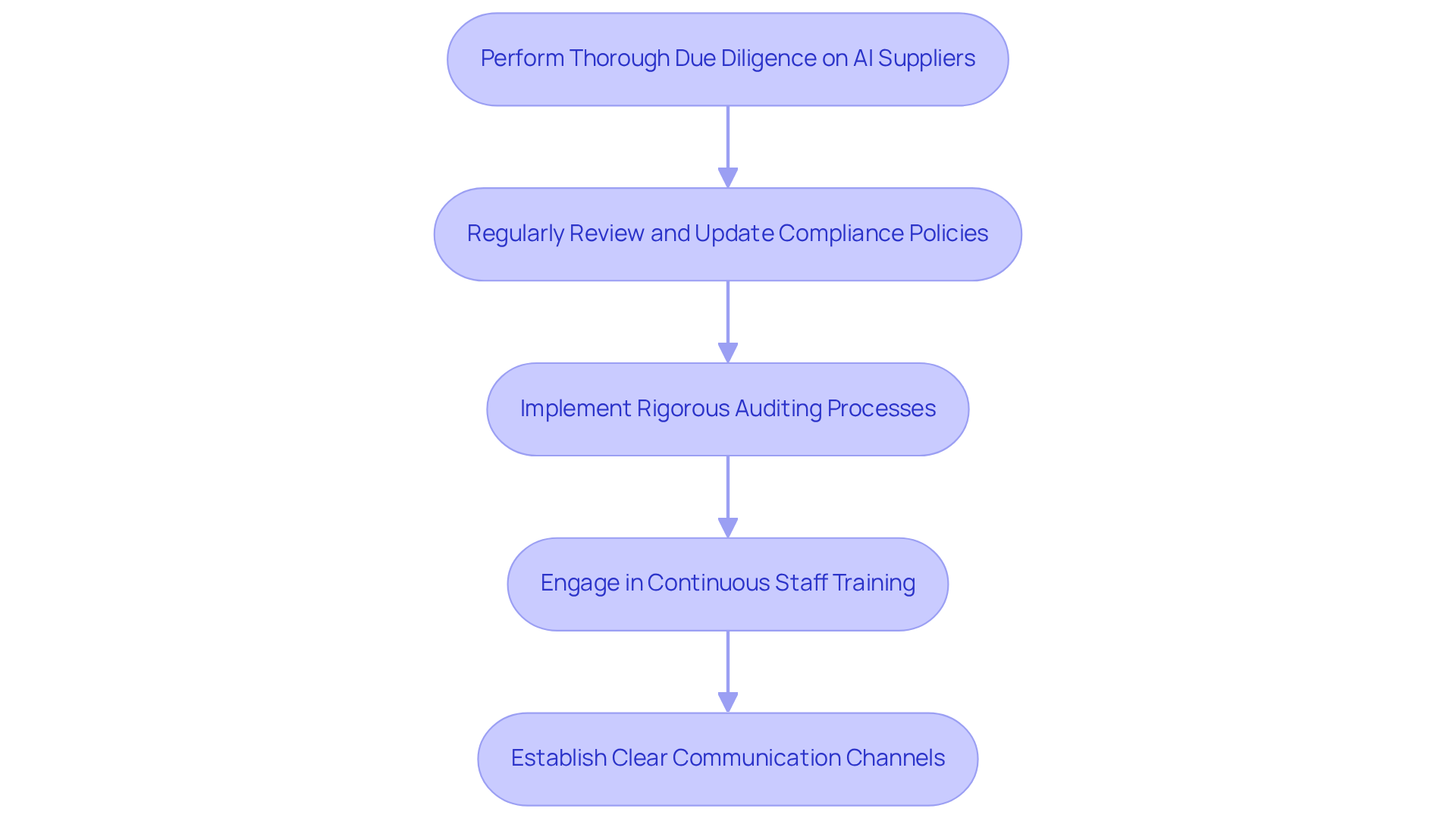
Conclusion
The integration of the OpenAI API into healthcare practices provides a meaningful opportunity to enhance operational efficiency while ensuring compliance with HIPAA regulations. This is not just about meeting legal requirements; it’s about fostering trust and integrity in the healthcare system. By leveraging advanced AI solutions, healthcare providers can navigate the complexities of patient data protection, all while upholding the ethical standards that are vital to their mission.
Throughout this article, we have explored significant insights, such as:
- The importance of Business Associate Agreements (BAAs)
- The implications of zero retention policies
- The necessity of ongoing training and monitoring for compliance
Together, these elements form a robust framework that protects electronic Protected Health Information (ePHI) against breaches and unauthorized access. By adopting these practices, healthcare organizations can significantly diminish risks associated with data handling and enhance the quality of care they provide to patients.
As the healthcare landscape evolves, embracing AI technologies like the OpenAI API can lead to more effective patient care and administrative efficiency. It is essential for healthcare providers to prioritize compliance and actively seek out HIPAA-compliant solutions. By doing so, they not only safeguard sensitive patient information but also position themselves as trustworthy stewards of healthcare excellence.
The journey toward achieving optimal compliance and operational effectiveness is ongoing. Every step taken today contributes to a safer, more compassionate healthcare environment for all. How can you take that next step? Together, let’s continue to build a healthcare system that truly cares for its patients.




